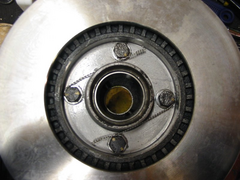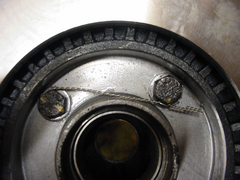Cheers
Michael





Just about to fit my cortina calipers to the uprights. The donor calipers had a locking tab under the bolts, though they are all rusty and I
don't want to reuse them. Local motorfactors sy they arn't available anymore...
Can I use thread lock instead of the locking tabs, reuse the donor ones, or does anyone know where to get new ones?
Tim
Thread lock would probably work (Never tried it yet though), or make a new locking tab out of some steel plate/strip that is close to the same
thickness as the origional.
The other option is to drill a small hole through the heads of the 2 bolts and use a peice of locking wire on them.
[Edited on 10/3/05 by clbarclay]
I am intending to use locking wire for the disk bolts but am feeling a little wary of using them on the caliper bolts - Will the SVA man have anything to say on the matter I wonder ?
I used threadlock and the SVA man said that was adequate.
Why not just use spring washers?
Cheers
Michael




As the donor vehicle had locking tabs I believe some SVA engineers like to see the locking tabs.
I made some, see my posting with the attached pdf here.
http://www.locostbuilders.co.uk/viewthread.php?tid=16941
Spring washers are worse than nothing, thy usually tend to try and squeeze out from under the bolt head and can occasionally actually cause the bolt
to then come undone!
I always bin the locktabs and use loctite. Pah to the SVA man on that one, what a load of cobblers. The Opel manta uses an almost identical setup to
the cortina and they don't have loctabs!!
I`ve made some for the calipers and for the disks, I could probably do some more for you if you want.
Spring washers don't like high torque. You tighten up a bolt to much with a string washer, and the washer just splays out.
A correctly torqued up bolt should hold itself surprisingly well.
locking tabs and thread lock are about par for holding a bolt, but thread lock is easier to do up, and can be a lot easier to remove.
Good high tensile locking wire is the probably the best, push the twisted ends down against the caliper and the SVA mans ball shouldn't trouble
it.
[Edited on 10/3/05 by clbarclay]
spring washer - yuk.... nuff said
torque alone - never! (on a part like this)
lock tabs - ok but hard to get hold of for some things
locking wire - best solution but leaves sharp ends to cut Mr SVAs fingers
thread lock - OK but never trusted it myself
Regards torgue on its own, just look at all (or nearly all) the internal bolts on an engine. There only torqued up.
On the subject of locking tabs, the big problem with them is that each tab is a use once item.
Good locking tabs should come with several different tabs, partly so you can get one square on a bolt flat, but also so that you an use a different
tab when rebuilding a component.
Thanks for the help...
I probably don't need the tabs for the discs to hubs as only one out of the two tabs are unused.
I'm an electronics engineer and not as mechanically mined as most of you... what do you mean by locking wire? How is it used for locking the
bolt?
Thanks
Westfield sell them. See here
http://www.westfield-sportscars.co.uk/shop/product.asp?P_ID=137&strPageHistory=search&strKeywords=tab&numPageStartPosition=11&strSearc
hCriteria=any&PT_ID=all
The biggest difficulty with locking wire is drilling a hole in the head of the bolt in the first place!
Lock wire can be dopne by hand but a far better result is obtained by using special pliers which are used to twist the wire. The essetial idea is to
physically lock the compnents by 'pulling' the bolt (or whatever) in the 'tightening' direction. sorry that doesn't sound
very clear
The most common fault in wire locking is when people go in the wrong direction and then it becomes pointless
As for the use inside an engine, the major parts on my rebuild will be locked!
this piccy shows some good locking techniques

An easier way to wire the bolts together is to do as bellow.
Also my eqperiance says that any pair of pliers will do within reason.
[Edited on 10/3/05 by clbarclay]
Rescued attachment locking wire.JPG
quote:
Originally posted by clbarclay
Regards torgue on its own, just look at all (or nearly all) the internal bolts on an engine. There only torqued up.
On the subject of locking tabs, the big problem with them is that each tab is a use once item.
Good locking tabs should come with several different tabs, partly so you can get one square on a bolt flat, but also so that you an use a different tab when rebuilding a component.
I used the original locking tabs for my cortina calipers and only bent up one tab on each bolt (thats how they were when I took them off the cortina
in the scrapyard).
My SVA man insisted that I bend the other tab over as well. He let me do it while he was checking something else.
All goes to prove SVA is "at the inspector's discretion"
quote:
Originally posted by DaveFJ
As for the use inside an engine, the major parts on my rebuild will be locked!
quote:
Originally posted by britishtrident
But they are Loctited any bolt subject to vibration should never never used without some for of anti-slackening locking
Traddiionally going back to dark ages big end bolts either used "Symonds" nuts, were wired (!), split pinned or had locking tabs.
On Imps we used get rid of the locking tabs on the big end bolts because they got hammered thinner at high rpm, the (always new) bolts and threaded
holes were cleaned properly then Loctited and torqued. These days big end and flywheel bolts are usually speced by the manufacturer to be replaced
every time they are removed and the new replacement bolts are supplied with a blue coloured locking compound pre-applied at the factory.
One of the big causes of bolts slackening off is using bolts that are either to big a diameter for the torque employed or have too short a length of
the shank under tension --- both result in the bolt not being stretched elastically enough.
[Edited on 11/3/05 by britishtrident]
[Edited on 11/3/05 by britishtrident]
Hit the nail on the head there Britishtrident, no black magic to it.
Would just add, one other cause of loosening (pretty much the same as your other 2 causes) is using too coarse a thread for the application, meaning
that it is impossible to apply sufficient torque to stretch the bolt properly before the threads "pick up".
melly-g - thanks for the offer. I've sent a u2u.
A couple of pics of my recently wire locked Brake disks........


wirelocking1


wirelocking2
A small amount of 'anti-fret' tape will be applied to stop the wire fretting against the hubs where they touch.
[Edited on 17/3/05 by DaveFJ]